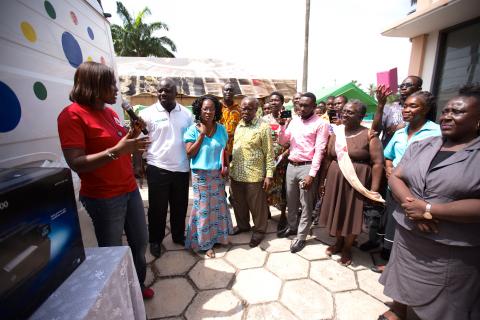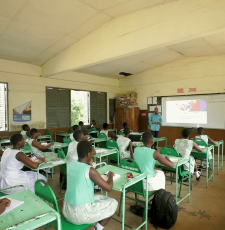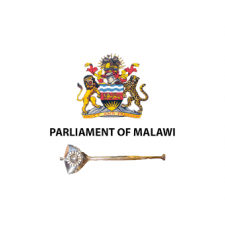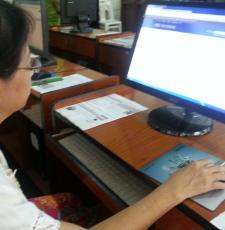
Children at schools in three regions of Ghana got their first experience of computers following the launch of the Hands on computer classes for 1,800 Ghana children project.
“This was my first time using a computer, and it was a bit difficult,” said Beatrice Adjei, a student at Archbishop Amissah Junior High School in Western Region.
Beatrice is determined to do well in her computer classes because she wants to be a doctor when she grows up. “Computers will help me with research online, for example, about chemicals. I believe they will make my work faster,” she said.
Another enthusiastic student is Erica Cobbineh, who is confident that in the long term, computers will make life easier for her - especially in her chosen career: journalism. “As a journalist I will be able to get a lot of information through the internet,” she said.
The project enables four regional mobile libraries to travel to schools with solar powered laptops pre-loaded with educational software and reading material to give struggling students hands on computer classes. Many schools in underdeveloped and rural areas of Ghana do not have computers, internet connections or reliable electricity. Without practical experience thousands of children fail their computer exams and cannot progress to secondary school.
The project was launched in three regions of Ghana - Western, Upper East and Ashanti regions - in November. The launch events were celebrations, attended by over 100 people, including officials of the Ghana Education Service, representatives of the Ghana Library Authority, schoolchildren, teachers and headmasters from 15 schools, and the regional librarians who coordinate the classes and operate the mobile library vans.
‘SHINE AND STAND TALL AMONG YOUR PEERS’
Addressing guests at the launch in Western Region, Ms Benedicta Aseidu, acting Human Resources Manager, Ghana Education Service, called on children to make full use of the learning opportunity presented by the new public library service: “I expect you to shine, to stand tall among your peers, and let it reflect in your Basic Education Certificate Examination,” she said.
Interviewed after the launch, Aseidu said the computers filled an important gap, and would play a vital role in improving children’s results in the compulsory computer examinations. She especially appreciated the educational material pre-loaded to the computers: “There is software in almost all school subjects, and exam questions for the children to practice. What is more, the children can have fun while they are learning. This is a marvelous project,” she said.
The Executive Director of the Ghana Library Authority, Mr Ofosu Tenkorang, commended Western Regional librarians for their commitment to the project, and thanked EIFL and the project partners for their support.
EDUCATION OFFICES PLEDGE FULL SUPPORT FOR THE LIBRARY SERVICE
In all three regions, the Regional Education Offices have embraced the new Ghana Library Authority service to rural schools, and pledged their full support for it.
In Ashanti Region, the launch took place at the premises of the Regional Education Office in Kumasi. The Deputy Regional Director of Education, Mr Joe K. Koranteng, assured participating schools that they had the support of the Regional Education Directorate. He encouraged headmasters, teachers and students to participate fully to ensure the success of the project.
In Upper East region, the launch took place at the regional library in Bolgatanga. The Deputy Regional Director of the Ghana Education Service, Mr Raymond Abatanie, said that over the years, the results of Basic Education Certificate Examination candidates in the region had not been encouraging. He hoped and believed that the project would reverse the negative trend.
Background
The project has its origins in Volta Region in 2012, when the EIFL Public Library Innovation Programme supported Volta Regional Library to take solar powered laptops to schools in underdeveloped parts of Ho Municipality, where it reached 600 children. A grant from the technology company Nokia, through the online fundraising agency, GlobalGiving-UK, which is a Nokia partner organization, enabled EIFL to expand the project to three new regions. To implement the new project, EIFL is working in collaboration with Ghana-based partners, the Ghana Library Authority, TechAIDE and the Implementers.
Read more about the Hands on computer classes for 1,800 Ghana children project.
SHARE / PRINT









